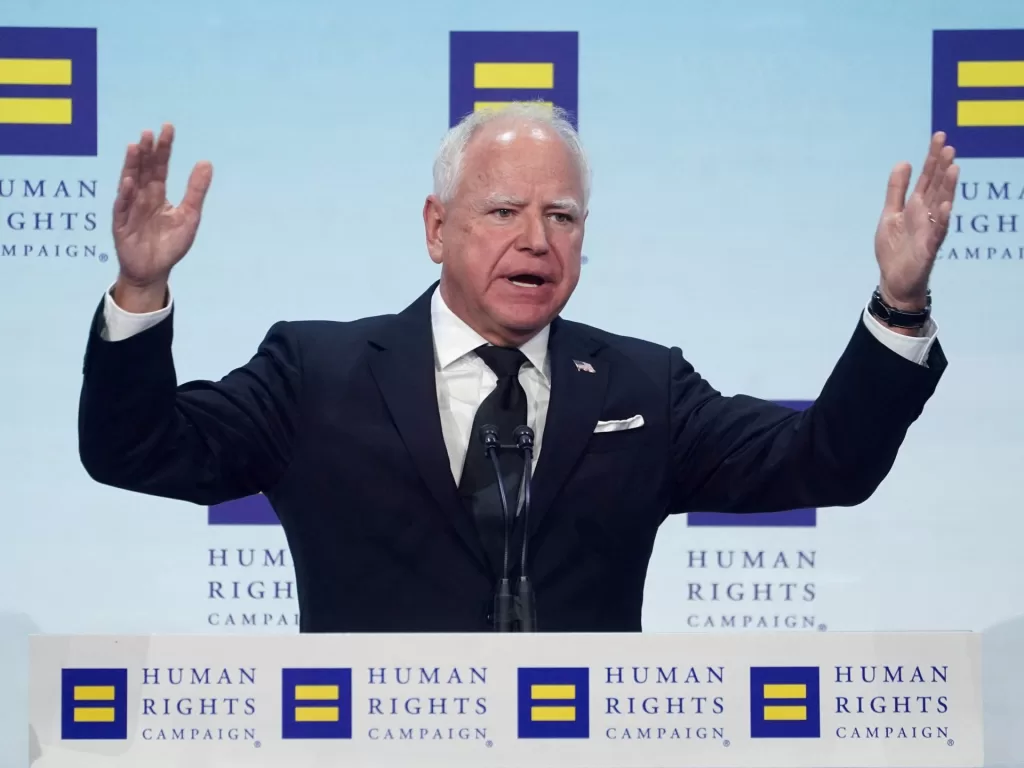The presidential race between Democratic Vice President Kamala Harris and Republican former President Donald Trump appears tight with just over a month to go until the November 5 United States election.
Both sides are now looking for potential advantages wherever they can find them, and one place will be in their vice presidential candidates, who are set for a nationally televised debate on Tuesday.
With Trump so far declining a second debate with Harris, the vice presidential debate between Democratic vice presidential nominee Tim Walz and Republican counterpart JD Vance could mark the last time candidates from each campaign meet face to face before the election.
Differing backgrounds
Vance’s and Walz’s rise to the second slot on their respective tickets offers signs of the rising trends in their respective parties. So do their backgrounds.
Walz, the Democratic nominee, has spent more than two decades in elected office.
He was born in a small rural town in the state of Nebraska and attended Chadron State College, earning a degree in social sciences and joining the National Guard. After university, he spent a year teaching overseas in China before returning to the US to pursue a career as a high school teacher and football coach.
Walz also served for 24 years in the National Guard, before retiring from the armed forces in 2005. He won his first political race in 2006, when he became a member of the US House of Representatives for a district in Minnesota – his wife’s home state, where he had moved in the mid-1990s.
He went on to win five more two-year terms in Congress before being elected Minnesota’s governor in 2018. He was reelected in 2022, winning each race by a healthy margin. While in office, Walz embraced progressive policies such as universal free lunches for schoolchildren and easing restrictions on abortion.
Vance, by comparison, is a relative newcomer to national politics. He enlisted in the US Marines in 2005, working as a military correspondent in Iraq. Neither Walz nor Vance ever saw combat.
After his time in the military, Vance attended college at Ohio State University and Yale Law School before going on to work as a venture capitalist in Silicon Valley, where he strengthened connections with financiers such as Peter Thiel, a right-wing billionaire who would later help bankroll Vance’s entry into politics.
But Vance first entered the national spotlight as the author of a bestselling memoir titled Hillbilly Elegy in 2016. The book tells the story of Vance’s often difficult upbringing in Ohio, including his mother’s struggles with drug addiction and his difficulty fitting in at elite institutions like Yale Law School.
It was praised by some as a window into rural, working-class parts of the country that suffered from economic deindustrialisation, while others criticised it as a simplistic and patronising assessment of life in the rural US.
Vance first entered politics in 2022 when he ran for an open Senate seat in Ohio.
While Vance was previously an outspoken opponent of Trump, dubbing him “America’s Hitler” and a “reprehensible” person, he leaned into Trump’s populist right-wing style of politics during that run, promoting Trump’s false claims that he was the true winner of the 2020 election and backing his scheme to remain in office despite losing.
That helped Vance win Trump’s endorsement, putting him ahead of other Republicans in the party primary. Vance arrived in the Senate after beating Democratic rival Tim Ryan in the general election.
What themes have they emphasised as candidates?
While the choice of a vice presidential candidate often has little impact on the outcome of a presidential race, they are often selected to help “balance” a ticket, helping counter perceived shortcomings in a presidential candidate.
Walz, as a popular governor from the Midwest with a track record of promoting progressive causes while maintaining the trust of more moderate voters, could help Democrats shore up support in key Midwestern states.
Joining Harris on the campaign trail, Walz’s plainspoken and affable personality has made him popular. The polling aggregator 538 says that 40 percent of voters see him favourably, with 36 percent viewing him unfavourably.
Vance, on the other hand, was seen as a pick made to signal affinity with the ‘MAGA wing’ of the Republican Party, referring to Make America Great Again, Trump’s longtime rallying cry.
Vance was chosen when Trump still expected to face Democratic President Joe Biden – severely hampered by low popularity and concerns about his age – in the presidential election, and the campaign may not have felt the need to appeal to a broader, more moderate range of voters.
Vance’s positions on issues such as abortion and immigration have been a problem for the campaign, with clips of Vance referring to unmarried women as “childless cat ladies” and his support for a nationwide abortion ban doing little to endear him to voters.
He has also attracted controversy by continuing to push false claims vilifying Haitian migrants, accusing them of eating animals. Pollster 538 shows Vance with a net unfavourability rating of about 11.3 percent, compared to a net favourability of about 3.8 percent for Walz.
What can we expect at the debate?
With the stakes high, both candidates will be looking to make an impression at Tuesday’s debate.
Vance may hold a slight advantage: Walz has admitted in the past that he is not a highly talented debater.
But Walz also has decades of political experience and has proven an effective communicator, and can point to achievements such as providing lunches for schoolchildren and support for labour unions as evidence of the Democratic Party’s support for the working class.
On the Republican side, Vance will likely hammer away at themes such as immigration and LGBTQ rights, a frequent topic of attack by the Republican Party. And for his part, Vance will zero in on criticism of Walz, including what the Republicans call his weak response to the 2020 George Floyd protests in his state.
